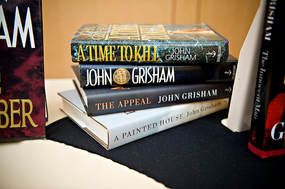 I recently read John Grisham’s latest, The Reckoning, a fascinating tale whose content and format are a departure from his norm. I wasn’t quite sure how to review the book and, when I went to read the comments of others, I realized I wasn’t alone. Those who are fans of John Grisham are addicted to the formula that won him such popularity: a young, idealistic lawyer goes up against impossible odds, beats the bad guys and (often) gets the love interest in the end. Most of his career has been based on this winning strategy. In his latest book, which uses an unexplained murder case as bookends for a harrowing tale about the Bataan Death March, Grisham gives readers a Gothic tale, murkier and more ambiguous than his normal fare. This has irked his readers, but I think that’s a bit unfair from the point of view of the writer. Growing up I read The Hardy Boys, while girls my age may have read Nancy Drew. These were formulaic serials in which variation and maturation were strictly forbidden. In the modern era, authors like Clive Cussler and Sue Grafton have done much the same (though Grafton, who passed in 2017, explored a bit more growth with her protagonist Kinsey Millhone). But what happens when writers want to grow and expand beyond what they have done before or even (Perish the thought!) write in a different genre? Well, they have to get a bit creative. Famed horror writer Stephen King created the pen name Richard Bachman, while more recently, best-selling Christian author Davis Bunn as adopted the persona of Thomas Locke to produce general market titles in a dizzying variety of genres. These writers, and many others who have assumed noms de plume to express their creative range, have done so because they yearned to defy the expectations placed upon them. As for my thoughts on The Reckoning, I will agree that while the book is not a good “John Grisham novel”, it is a good novel by John Grisham. The fact I have to make this distinction saddens me.
0 Comments
 I have been a fan of Thomas’ work for years and read just about everything he has written, so I was delighted to have the chance to connect with him about the creative process. An award-winning, best-selling author, his weaves together great stories about the past, present and future with style and skill. The globe-trotting Oxford don divides his time between Florida and England and has most recently delved into the realms of epic fantasy, science fiction and techno-thrillers. When did you first realize you were a storyteller? I came to faith at age 28 and started writing two weeks later. Up to that point, I had never picked up a pen for anything longer than a business report. Two days into the experience, I knew there was nothing else I wanted to do with the rest of my life. This desire was tested, tempered, and used (I think) for the basis of learning the true meaning of spiritual discipline. I wrote for nine years and completed seven books before my first was accepted for publication. During that time, I ran a business consulting group based in Germany. I traveled to two and sometimes three countries every week. My goal was to maintain a twenty-hour workweek on top of that for the writing. I failed a lot. But I also learned to focus. What do you love about the writing process? There is a deep and permanent bond between my spiritual walk and my creative process. A great deal of who I am as a believer is bound by what I write, and how this creative process unfolds. What is the hardest part of being a writer? I would imagine most writers say something about the commercial process, such as dealing with rejection, or the uncertainties bound in the market and what it means to release a work. For me, all those are tough. But the hardest thing is time. I have so much I want to do, so many stories I want to tell. And there are just so many hours granted to us. NEED TO BREATHE has a song on their latest album titled "We Don't Get To Be Here Long". That song cuts like a knife. Where do you find your inspiration? It depends on the book. For a number of the Thomas Locke titles, there is an element of spiritual awakening, even in stories that have no overt spiritual component. I have had some of the most profound, and profoundly disturbing, dreams of my entire life become foundations of these stories. What are you working on right now? The Emissary series has been acquired by a UK film group, who hope to enter pre-production in April. I was contracted to write the screenplay. This has become a huge element in my current schedule. You can find out more about Thomas and his latest projects at www.tlocke.com. One thing I have learned as an author is that once you have drawn readers into your type of storytelling, they are hungry for more. There is a reason John Grisham uses the same structure in most of his novels: it sells really, really well.
But sometimes as a writer you want to explore a new type of story or different genre altogether. The fear, of course, is that people won’t join you on this journey. I have a manuscript in the works that is a significant departure from my first book and I am pondering how to market the project. I even briefly thought of using a nom de plume to separate it from the sequel I also am planning to Chasing Deception. Speaking of assumed identities, one of my favorite authors who I had a chance to meet at a writers conference a decade ago, has written a new mythic fiction book under a pen name. Revell recently sent me a complimentary, advance copy of this book, Emissary by Thomas Locke, in exchange for an honest evaluation of its merits. While I normally don’t write book reviews on my blog, I thought I would make an exception here because I admire how this award-winning author bravely is striking out in a new direction with this work, thus encouraging me to do the same. Locke was wise to publish this title under a different name, as it is a departure from what people expect from him. His other works are distinctly Christian in nature and Emissary, while not anti-Christian, stays true to the mythic fiction genre in a way that might make his regular readers uncomfortable. In particular, there are mages who use spells to battle evil forces. While this might upset some in his traditional audience, he would not be true to the body of literature he is joining if he ignored such elements. Having said that, I must note Emissary is quite well structured, blending character development and conflict to engage the reader throughout the tale. The work is reminiscent of Stephen Lawhead’s Pendragon Cycle in that it embraces the mythic fiction genre but avoids some of its darker elements. You may have the use of magic, but the force is more of a weapon against evil than a blueprint for the reader channeling such powers for his or her own use. There are battle sequences and a romantic subplot, but Locke refrains from the graphic narrative techniques so popular today. Game of Thrones, it is not. In Emissary, Locke reinvents himself, writing in a grand style evocative of his earlier work. He takes us to a new land resplendent in rich detail and introduces us to flawed heroes driven to impact the world around them in a powerful and dynamic fashion. Locke dives deep into the world of mythic storytelling, creating compelling characters readers would follow on a grand quest to fight the forces of evil. Sign me up for the next adventure! |
AuthorI've been writing stories and taking photos since I was old enough to hold a pencil and stand behind a tripod. Archives
February 2024
Categories
All
|
 RSS Feed
RSS Feed